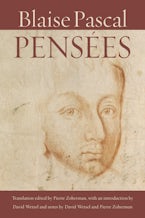- Home
- philosophy
- Pensées
Preparing your PDF for download...
There was a problem with your download, please contact the server administrator.
Pensées
Translated by Pierre Zoberman
Introduction by David Wetsel
Imprint: Catholic University of America Press
Blaise Pascal (1623-1662) was a French mathematician, physicist, and religious philosopher, who laid the foundation for the modern theory of probabilities. The Pensées are made up of some 800 fragments, that have proven to be an enduring masterpiece since their initial publication in 1670.
This volume is a translation of Philippe Sellier’s edition of Pascal’s Pensées, in addition to two shorter texts, the Exchange with M. de Sacy and The Life of Monsieur Pascal by Pascal’s sister, Gilberte Périer. In addition to a Preface and an Introduction, there is a comprehensive apparatus criticus. The text was originally produced by a team of international Pascal scholars, who translated individual sections and was revised by the General Editor. The introduction situates the Sellier edition in the history of Pascal scholarship and highlights the advance its reordering of the fragments and of the folders or bundles represents, both the translation itself and the notes allow for a deeper reading of the text. It not only gives English readers a version of the authoritative Sellier edition of the collection of reflections known as The Pensées, it also proposes material which help assess the philosopher’s significance and the originality of his thought.
On the whole, this translation gives a comprehensive view of the progress of Pascal’s intended Apology of the Christian Religion as well as of other writings on related topics. It also provides today’s readers with a challenging set of arguments, prayer, and quotations from Scripture, and even the record of a mystical experience, known as the Memorial. It highlights all facets of Pascal’s genius, his familiarity with Scripture combined with a talent for controversy, irony mixed with fervor, and altogether the production of an intriguing and challenging writer and thinker.
The translation team consists of: Gary Ferguson, University of Virginia, Pierre Force, Columbia University, John Gallucci, Colgate University, Nicholas Hammond, Cambridge University, Erec Koch, City College of New York, Francis Mariner, Iowa State University, Michael Moriarity, Cambridge University, Richard Parish, Oxford University, Richard Scholar, Durham University, Paul Scott, University of Kansas and David Wetsel, Arizona State University.
Blaise Pascal (1623-1662) was a French mathematician, physicist, and religious philosopher, who laid the foundation for the modern theory of probabilities. Pierre Zoberman is professor of French literature at the University of Paris. David Wetsel is professor of French at Arizona State University.
"This is the first well-informed translation of Pascal's Pensées as they were found by his family after his death, and it gives us the chance to discover that the Pensées cannot be reduced to an eloquent expressionistic Augustinian theology and that Pascal has his place in the philosophical context of his time, determined essentially by the rival systems of Descartes, Gassendi and Hobbes. Pascal's reading of Montaigne is well-known; he supports Montaigne's conception of the status of ‘custom’ in human ‘nature,’ adopting Descartes's definition of ‘passions or sentiments of the soul’ and Gassendi's conception of scientific observation and testimony. The result is a new, very modern definition of religious faith (without divine grace), equal in status to all our convictions which boil down to ‘sentiments’ enforced by education and habit. Pascal's conception of belief – in all fields and not only in that of religious faith – thus heralds that of Hume. Pascal refuses metaphysical and ‘natural’ proofs of the existence of God: the ‘God of Abraham, Isaac and Jacob’ is the God to be discovered in the Bible alone and through the historical testimony of the life and teachings of Jesus Christ. The Biblical lesson alone gives meaning to man's present sense of ‘misery,’ i.e. his feeling that life is absurd. In Pascal's reading, everything in the Bible that does not promote charity is ‘figurative’ (metaphorical). His reflections can thus be considered in the context of contemporary Biblical exegesis, radically altered, shortly after his death, by Spinoza and Richard Simon."
~Antony McKenna, Emeritus Professor in French, University Jean Monnet Saint-Etienne, and research-team IHRIM (CNRS)
"Reading Pensées afresh in this latest edition, I was amazed how truly insightful Pascal can be regarding the human condition, and prescient regarding the problems we moderns face centuries removed from his comparatively more pastoral, and less frantic French life."
~Catholic Thing


